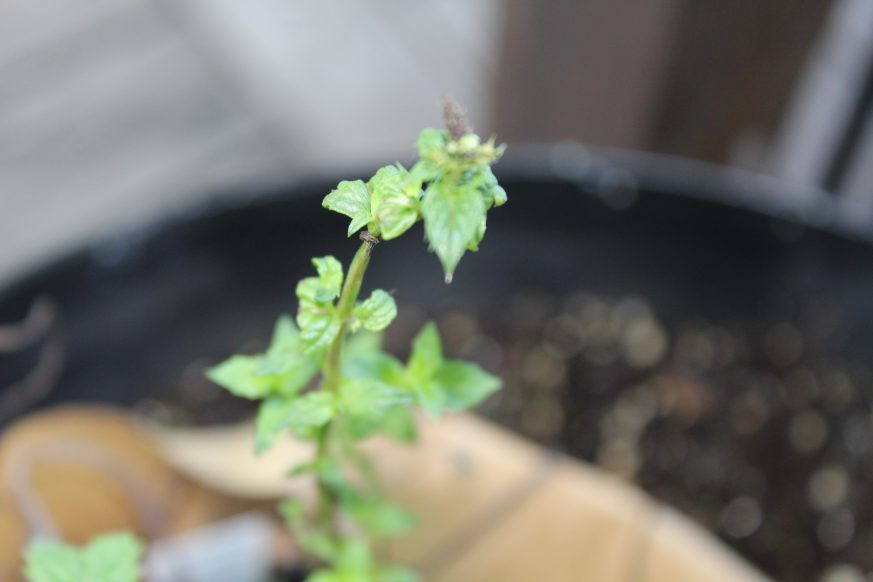- Home
- Daily Meditation
Who Makes the King?
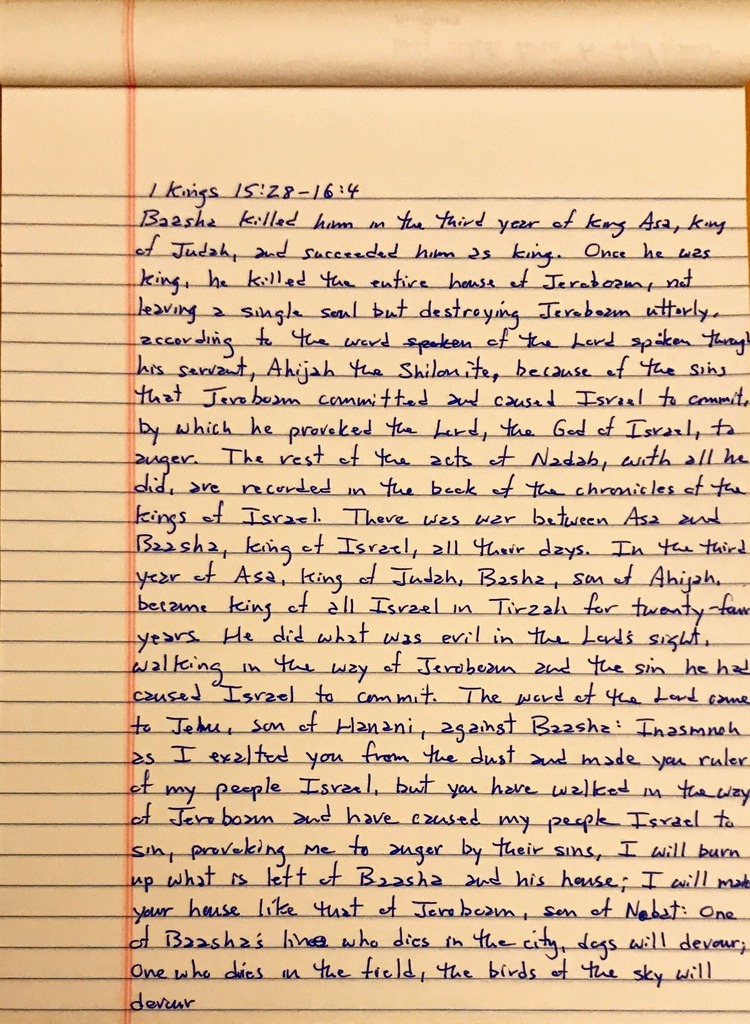
Synopsis 1Kings 15:28-16:4 5/22/2019
Nadab was the son of Jeroboam. As a result, he became king after Jeroboam’s death. But his reign lasted only two years before he also died.
But before he died, Nadab led the Israelite forces against the Philistines. His army besieged the Philistine city of Gibbethon. During the siege, a man named Baasha assassinated Nadab. And then, Baasha named himself king of Israel.
Nadab hailed from the tribe of Issachar. And once he was king, he killed all of Jeroboam’s descendants. He did this to prevent a rival to his throne. However, Baasha continued the practice of idol worship that had begun with Jeroboam.
And so, one day Jehu the prophet came to King Baasha. He prophesied that Baasha would meet a similar fate as had Jeroboam and his family.
Who Makes the King?
The northern tribes of Israel had several kings in quick succession. And the trend was disturbing. They went from the situation where tribal leaders appointed Jeroboam as king to the situation where Baasha simply made himself king. The migration toward “might makes right” seemed to quickly be leading toward tyranny.
Who Made My King?
God is in authority. He is my king.
And to accept the truth of this claim means that I accept that God actually is king. But, not only that. For, He isn’t king because I said He was king. And He isn’t king because I think He should be king. What’s more, He isn’t even king because most humans agree he should be followed.
It’s important for me to recognize that my freedom doesn’t extend this far.
I’m not the kingmaker. He’s king because He is creator and author. He is worthy and He is eternal. He could be nothing else.
“Thomas answered and said to him, ‘My Lord and my God!’” John 20:28
King Asa’s Bribe
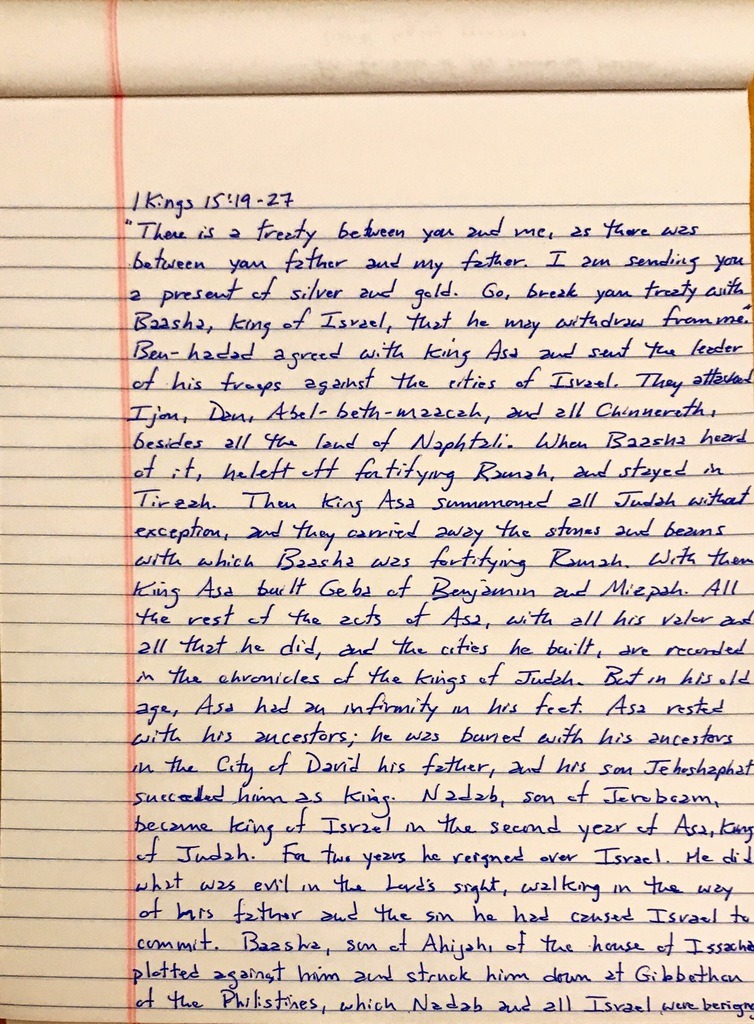
Synopsis 1Kings 15:19-27 5/21/2019
King Baasha was the ruler of the northern kingdom. And Asa was ruler over Judah and Jerusalem. And they were always fighting. The nature of the conflict had to do with borders. But it also had to do with the flow of money.
For despite the new religion of the northern kingdom, many Israelites remained faithful. They lived and worshipped in accordance with the Law of Moses. And so, they made the annual pilgrimages to Jerusalem. And this is where they tithed.
So, a lot was a stake. The kings were fighting for religious freedom. But they were also fighting for the flow of money and loyalty.
Baasha decided that he needed to get control. So, he pushed his military toward Asa’s forces. And Asa’s forces could not resist Baasha’s thrust. So, King Asa gathered money from his personal wealth and the temple treasury. And he sent this bribe to Ben-hadad, the king of Aram, who ruled in Damascus.
In return, Ben-hadad attacked cities in the north of Israel. And, as a result, Baasha redirected his army to the north to counter this threat. After Baasha departed, Asa’s forces came and disassembled Baasha’s fortress at Ramah. And then they used the materials to fortify their own positions.
After ruling for forty-one years, King Asa died. He was succeeded by his son Jehoshaphat.
King Asa’s Bribe
It was a brilliant tactical move. King Asa bribed the leader of a proximate nation to attack King Baasha in the north in order to distract Baasha from his battle in the south.
But it put Asa in the uncomfortable position of asking a foreign power to attack his fellow Israelites. So, the tactic was brilliant. But it was also a new low in the perpetual unraveling of the Israelites as a kingdom. The perpetual war was no longer simply a matter of brother fighting against brother. Now, one brother was asking unrelated people to fight against his own flesh and blood.
This family was deeply broken. And the evidence of the breach had become international common knowledge.
Keeping It In the Family
Jesus once said, “They will know you are my disciples by your love for one another”. As a community of disciples, it is the evidence of our love for one another that attracts people to Jesus. At least in my case, it was this that attracted me.
So, disputes between Christians are rightly the lament of generations. But disputes that cannot be resolved amicably within the community are evidence of a deeper lack.
It is said, “Blessed are the peacemakers”. God didn’t reserve this message for the leaders of nations. Jesus said this to you and me. It begins in my family and in my parish.
And it’s not that we want to hide our collective failures from view in order to appear more together than we really are. Instead, God gave the command so that we might resolve disputes peaceably and in a way that protects each man’s dignity through respect and genuine love.
“How can any one of you with a case against another dare to bring it to the unjust for judgment instead of to the holy ones?” 1Cor 6:1
Asa Keeping the Road Open
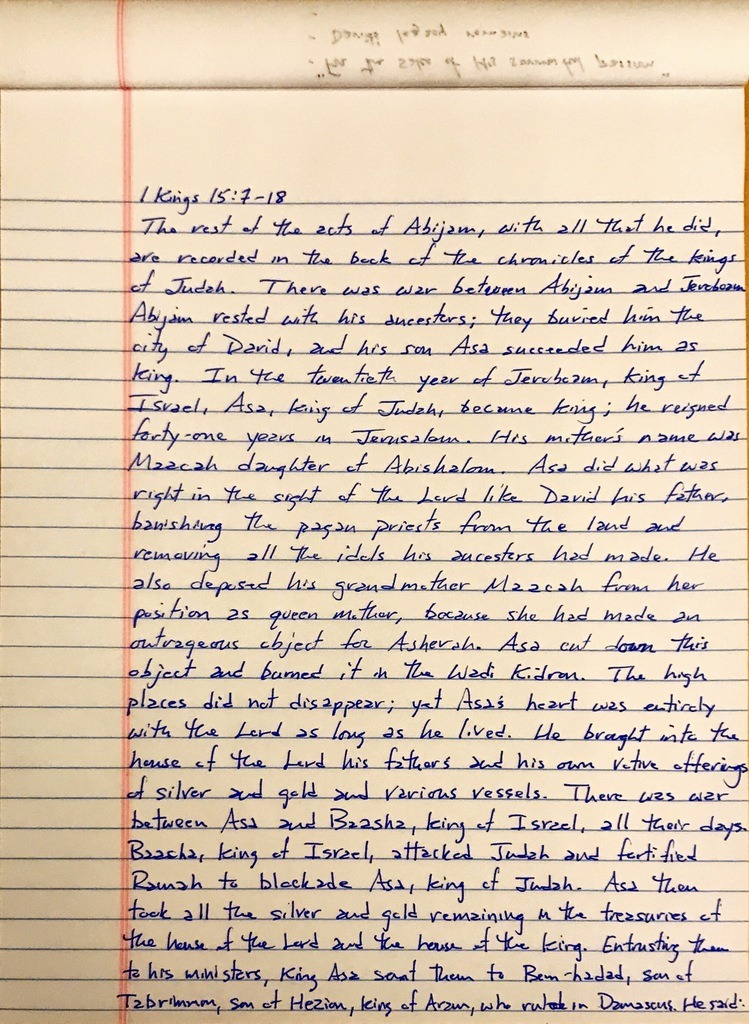
Synopsis 1Kings 15:7-18 5/20/2019
Asa became king over Judah after his father, King Abijam, died. Remarkably, King Asa ruled from Jerusalem for forty-one years.
During his reign, he was favorably compared to his ancestor King David. In fact, the people praised him for doing what was right in God’s sight.
Conversely, in the northern kingdom the people made Baasha their new king. He did not follow God.
And so, Asa and Baasha engaged in a low intensity conflict all of time they both reigned. At one point, Baasha was working to fortify Ramah. This city was located in the northern kingdom. And it was situated by the main north-south route. As a result, controlling Ramah was necessary to controlling traffic between the northern kingdom and Jerusalem.
Of course, Baasha wanted to control the route to discourage pilgrimage to Jerusalem. In effect, he wanted to prevent faithful Israelites from going to the temple. And, he specifically did not want Jerusalem to receive the tithe of his people.
Accordingly, Asa committed to keep the roads opened.
Asa Keeping Open the Road
Asa’s heart was for God’s people. Even though the Israelite kingdom had been ripped into two parts, the only authentic worship of God took place in Jerusalem. And Jerusalem was in the south.
So, Asa focused his attention. He believed that the northern people who had remained faithful to God should worship in Jerusalem. And, he intended to keep open the road.
Jesus is the Way
God committed to be available to you. And though this world sometimes seems intent on keeping you away, the apostle reminds us that nothing can separate you from God.
In the ministry of Jesus, God made the way.
The road remains open.
“Jesus said to him, ‘I am the way and the truth and the life. No one comes to the Father except through me’” John 14:6
David’s Legacy Persisted
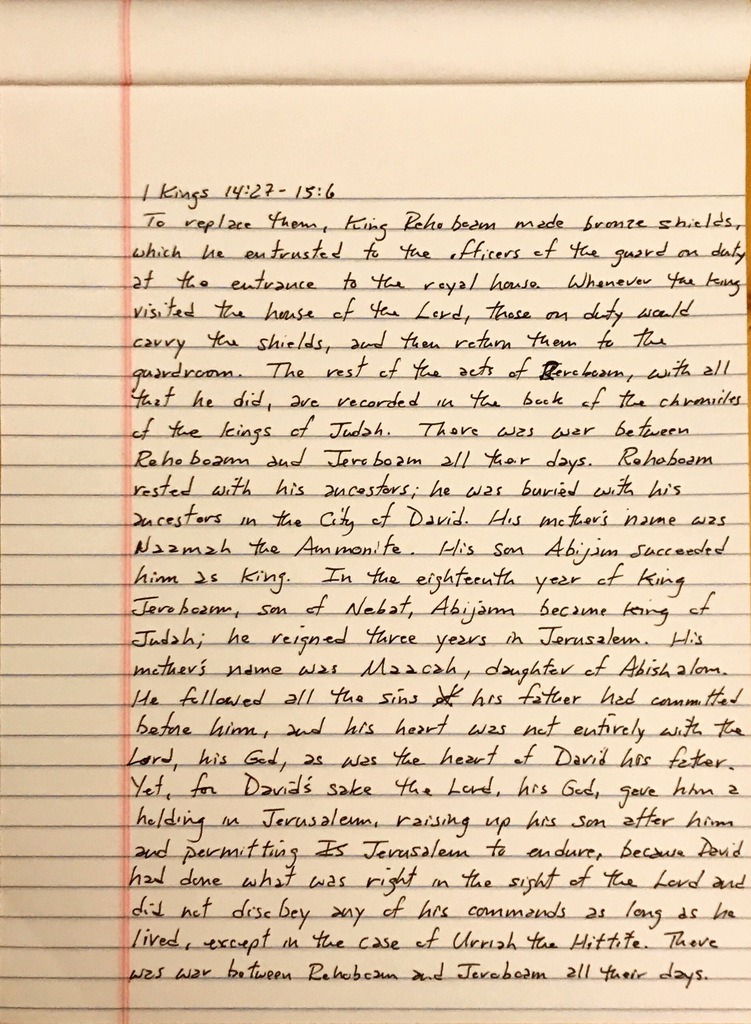
Synopsis 1Kings 14:27-15:6 5/17/2019
Rehoboam was king over Judah. But after he had ruled for only five years, Jerusalem was sacked. King Shishak of Egypt came and invaded the city. And when he departed, he looted the temple treasury and the king’s palace.
Along with much other loot, he took the ceremonial shields that Solomon had fashioned out of the gold from Sheba and Tarshish. But Rehoboam replaced the golden shields with shields made of bronze. And he continued to use these in ceremonies involving the temple.
Rehoboam died after reigning for seventeen years. Abijam, his son, succeeded him as king over Judah. But Abijam was similarly half-hearted in his service to the Lord. And so, he reigned only three years.
Still, God continued to allow the house of David to rule over Judah. But this was because of David’s legacy and not because of the righteousness of either Rehoboam or his son Abijam.
David’s Legacy Persisted
David’s grandson and great-grandson both became kings. But in neither case was their kingship founded on the virtue of the two men. Instead, both men ascended to the throne solely because of the righteousness of their common ancestor.
The Legacy of Christ
You are an heir to Christ. Like the ancient House of David, His righteousness created the possibility of your life in grace. And so, His legacy is fully manifest in the life you choose to live.
“But if Christ is in you, although the body is dead because of sin, the spirit is alive because of righteousness.” Rom 8:10
The Confidence of Two Kings
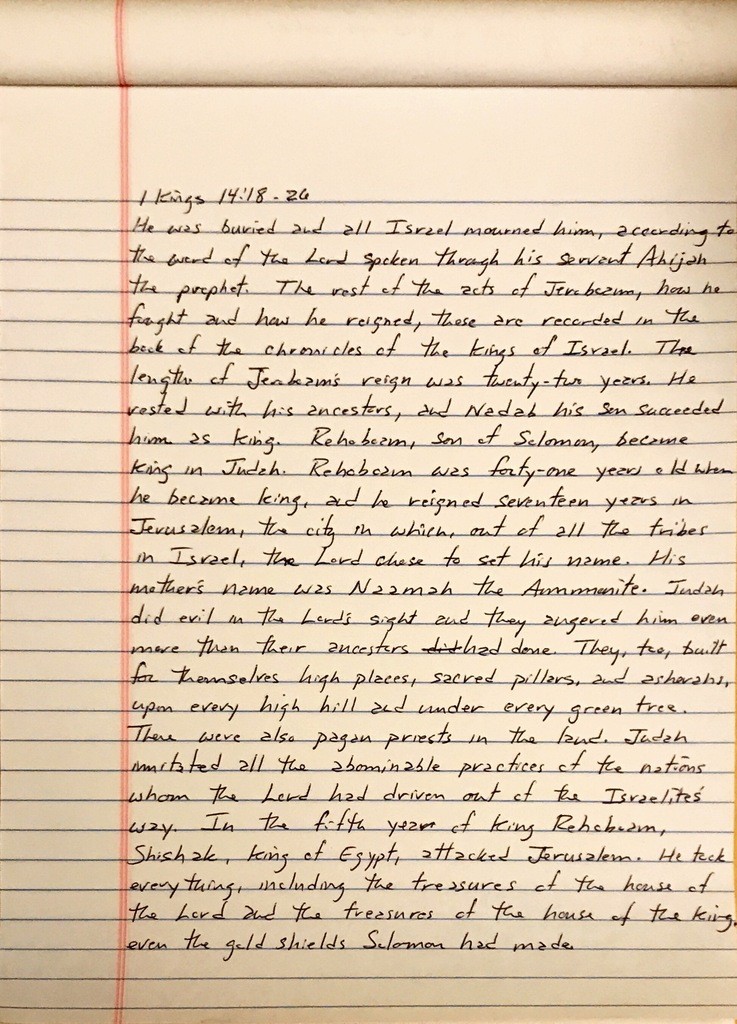
Synopsis 1Kings 14:18-26 5/16/2019
Abijah, King Jeroboam’s son, died. He was buried and all of the kingdom of Israel mourned for him.
After this, Jeroboam continued to reign until his death. And upon his death, his son Nadab became king in the north. In all, Jeroboam was king for twenty-one years.
Meanwhile, Solomon’s son Rehoboam ruled over the tribe of Judah. However, under his rule the people of Judah began to practice idolatry. And, just as in the northern kingdom, God allowed for a correction.
So, in the fifth year of the reign of Rehoboam, the king of Egypt sacked Jerusalem. He took most of the valuables from both the royal palace and the temple treasury.
The Confidence of Two Kings
Although they were adversaries in life, King Rehoboam and King Jeroboam actually had much in common. They both enjoyed the power of their authority. And they were both indifferent to their need for God’s mercy and grace.
The Origin of My Confidence
Confidence is a remarkable thing. It sometimes seems to have a self-fulfilling quality.
In fact, my belief that I can accomplish what I set out to do is powerful. Justified or not, it creates a kind of natural momentum. And when a I create an aura of momentum; other people take notice. Often times, they even want to follow and support whatever it is that I hope to accomplish.
So, there’s that expression: “Fake it ‘till you make it”. And part of “faking it” is persuading everyone around that I’m not faking it. The confidence of bravado. That’s the kind of self-generated non-sense that I have too often relied upon.
But notice how something happens in the company of authentic confidence. Encountering a person grounded in an deep relationship with God is both disturbing and refreshing. Their confidence in God sets them free from the need to persuade others of their value. They have no need to “fake it”. And it also sets them free from the need to be honored, or followed.
It wrecks my bravado and reminds me that only one thing can support real confidence.
“Rather, when you are invited, go and take the lowest place so that when the host comes to you he may say, ‘My friend, move up to a higher position.’ Then you will enjoy the esteem of your companions at the table” Luke 14:10
Jeroboam: God Like Dung

Synopsis 1Kings 14:9-17 5/15/019
The prophet Ahijah spoke to Jeroboam’s wife. She sought to understand whether or not her child would survive. But instead, Ahijah prophesied against King Jeroboam’s wickedness. Specifically, the prophet condemned the king’s practice of worshiping false gods. And so, he foretold that God would cutoff Jeroboam’s – that no male heir would survive him to become king.
After this, the prophet further informed Jeroboam’s wife that her child would die as soon as she returned to her home. And as she returned – the moment she crossed the threshold of her house – her son died.
Jeroboam: Treating God Like Dung
Now, God said through the prophet, “you have cast [me] behind your back”. Of course, this is another way of saying that Jeroboam treated his relationship with God like refuse or dung. God felt like refuse.
And this treatment provoked God to wrath.
Treating God Like Dung
Do I treat God like dung?
Well, I’ve definitely had people in my past tell me that I have treated them like dung. And I know enough about myself to recognize the kind of selfishness it takes to give others the impression that I don’t care about them.
And, as Jesus said, “whatever you did to the least of my brothers… you did for me.”
Even in the absence of guilt and shame, I suppose I have to conclude that I have also treated God like dung. I don’t think I intended this. But still, I have allowed my own selfish dispositions to rule over me to the point of indifference for those around me. I am guilty.
The Jesus Prayer: “Lord Jesus Christ, son of God, have mercy on me a sinner.”
“And the king will say to them in reply, ‘Amen, I say to you, whatever you did for one of these least brothers of mine, you did for me.’” Matt 25:40
And Yet,
“I tell you, the latter went home justified, not the former; for everyone who exalts himself will be humbled, and the one who humbles himself will be exalted.” Luke 18:13
Jeroboam Searching Truth

Synopsis 1Kings 13:34-14:8 5/14/2019
King Jeroboam had a son. His name was Abijah. And Abijah was sick with a serious illness.
So, Jeroboam instructed his wife to travel in disguise to Shiloh. Once there, he told her to find the prophet Ahijah. In accordance with the king’s instructions, she went.
Meanwhile, God spoke to Ahijah. Specifically, God informed Ahijah that the king’s wife was coming and He told him how to respond to her inquiry.
Jeroboam Searching for Answers
Jeroboam wanted to know what would happen for his son. And he knew that Ahijah the prophet might know. However, he could not be seen seeking out a prophet of God because the prophets had condemned his newly formed religion.
So, he sent his wife. She was desperate for an answer. And so, she agreed to travel in disguise to meet the prophet.
Everybody’s Searching for Answers
Everyone is searching for answers. Everyone wants to know the truth.
Jesus once said, “Seek and you shall find…”
So, that’s the admonition. If I seek, I will find. Anyone who wants to know the truth will eventually find Jesus.
“and you will know the truth, and the truth will set you free.” John 8:32
Jeroboam & Half God’s Will

Synopsis 1Kings 13:25-33 5/10/2019
The old prophet had tricked the prophet from Judah. He convinced him to eat on his journey even though God had specifically commanded him to refrain. And then, after he tricked him into eating, he prophesied against the Judahite prophet.
So, when the prophet began his return, he was attacked and killed by a lion. But the lion did not eat the prophet’s body and it did not attack the donkey on which he had been riding. So, the old prophet came and retrieved the body. And he buried the prophet in his own tomb.
He told his sons to bury his bones with the prophet from Judah – the greatest honor the old prophet could have bestowed. And he mourned the prophet’s death. Yet, despite all of these happenings, Jeroboam continued to worship inappropriately. And he even expanded the priesthood of common people.
Jeroboam & Half God’s Will
Hearing from God is a big deal. And receiving a mandate to act comes with a certain responsibility.
Before he was king, Jeroboam received a clear prophecy. According to the prophet, he was to rule the northern tribes of Israel. But his mandate from God was the result of King Solomon’s apostasy. Jeroboam should have known that founding his own religion wasn’t part of God’s plan.
When the Judahite prophet came to Jeroboam, he condemned the false altar. And this prophetic condemnation eventually came to pass. But in a strangely similar way as Jeroboam, the prophet later persuaded himself that following the whole prophecy wasn’t necessary.
This is how the old prophet was able to distract and confuse him. And, in the end, doing only half of God’s will led to his ruin.
Half God’s Will
I am saved by faith, not by works. So, in the same way the Judahite prophet did not lose the honor of being a prophet, I won’t be condemned if I cling to God’s promise.
But still, something is lost when I compromise and fail to do all that God has asked.
For the great challenge of compromise is that comes unnoticed. It’s an argument in my head that seems entirely plausible – maybe even obvious. And yet, it leaves behind a confused testimony and my life-purpose half-done.
“If anyone says, “I love God,” but hates his brother, he is a liar; for whoever does not love a brother whom he has seen cannot love God whom he has not seen.” 1John 4:20
Jeroboam & Lying Prophet
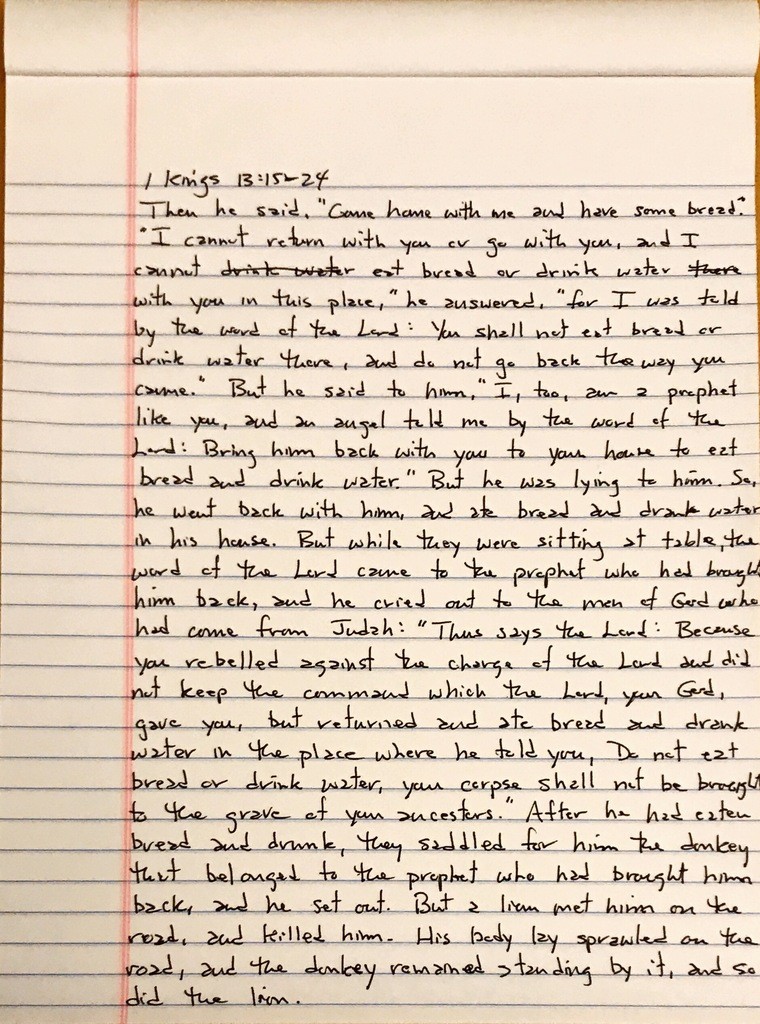
Synopsis 1Kings 13:15-24 5/9/2019
God tasked the prophet from Judah with giving a prophecy. So, he prophesied to King Jeroboam. And he told the king that God was displeased with the altars he set up throughout the land.
His word was accompanied by a sign. God briefly paralyzed the king until the prophet prayed for him. And then, God healed him.
After this, the prophet remained steadfast. He refused to take food or water from Jeroboam. And almost immediately, he began his return home.
But, another prophet of the Lord heard what had happened. And so, this prophet went in pursuit of the prophet from Judah. He eventually caught up. And he prevailed upon him to return to Bethel and eat with him. Initially the prophet refused.
But the second prophet identified himself as a prophet. What’s more, he lied to the prophet from Judah. He told him God had directed him to give food and water. So, the prophet from Judah relented and agreed to eat and drink. But as he did, the second prophet received an actual word from God.
He prophesied against the prophet of Judah for disobeying the original word to neither eat or drink. And part of this prophesy was the anticipation that the prophet from Judah would die. So, when the prophet from Judah finally began his journey home, he was almost immediately attacked and killed by a lion.
The Lying Prophet
This one of the strangest passages in scripture. The motive of the prophet from Judah is obvious. He meant to fulfill the word of the Lord – though doing so was not easy. For example, it wasn’t easy to confront Jeroboam in his homeland. And it wasn’t easy to go without eating during the journey. Nor was it easy to travel home a different path than the way he had come. Yet he met all of these challenges.
But the motive of the lying prophet is confusing. The lying prophet didn’t feel conflicted. He had a clear purpose from the beginning. For, as soon as he heard about the prophet from Judah, he immediately sought to pursue him. And when he met the prophet, he was persistent in his efforts to cause the prophet to fail in his mission. He even went to the extent of lying.
Yet, whatever else may lay within this story, God has clearly communicated the critical need to remain steadfast. The Judahite prophet could have saved himself. He could have remained steadfast in his determination.
And so emerges a message: In doing God’s will, the greatest vulnerability is the myriad interpretations and claims that other people make about God.
My Vulnerability
The world is awash with interpretations of God’s word. And strangely often in my experience, these interpretations oppose one another. Messages and messengers abound. But which is right? And who can I trust?
If I give ear to every voice, then it’s hard to know. And, amidst the cascade of confusing dialogue, I feel vulnerable.
In the end, living in The Way is about learning to hear the voice of My Master. It’s about me learning to hear the voice of Jesus. This is the one thing.
This is loving God and loving my neighbor with all my heart, and all my spirit, and all my strength.
“But you do not believe, because you are not among my sheep. My sheep hear my voice; I know them, and they follow me.” John 10:26-27
Jeroboam, Affliction, Healing
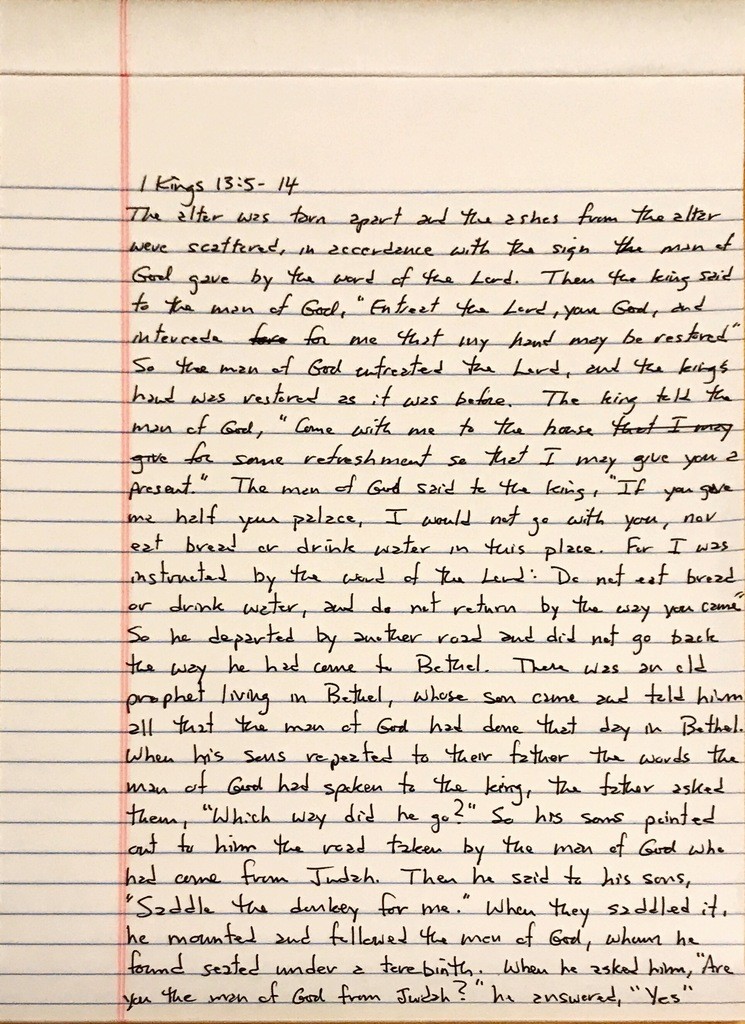
Synopsis 1Kings 13:5-14 5/8/2019
King Jeroboam had constructed altars throughout the northern Israelite kingdom. One day, while he was offering sacrifice before an altar in Bethel, a prophet of the Lord came to him from Judah. The prophet condemned the altar. So, Jeroboam commanded his men to apprehend the prophet.
But as he gave the command, he simultaneously experienced a paralysis. Jeroboam recognized that the paralysis was a result of his defiance. And so, he begged the prophet to intercede with God on his behalf. In accordance with his request, the prophet prayed for healing. And, God immediately healed Jeroboam.
The king resolved to reward the prophet for healing him. So, he asked him to stay and eat at the palace. But the prophet refused. He told the king that the Lord instructed to return immediately to his home. Additionally, he had been instructed by God to neither eat or drink during his journey.
Jeroboam, Affliction and Healing
The Judahite prophet offended Jeroboam. The new king’s project was to create a new religion and a distinct culture different from the one in Jerusalem. For this reason, any prophet working against him was a provocation. But a prophet from the tribe of Judah was simply intolerable.
Of course, Jeroboam’s mandate from God was to rule the northern Israelite kingdom. It wasn’t to start a new religion.
But, Jeroboam interpreted the temple in Jerusalem as a threat to his authority. So, he reasoned that starting a new religion was the only way to assure the security of his kingdom.
As a result, it only made sense to persecute the prophet. But, the paralysis that afflicted Jeroboam as a result of his persecution was a wake-up call. He realized that he had strayed from God’s intention and he repented.
Affliction and Healing
I find myself afflicted. Maybe my own bad habits have resulted in a disease. Or, maybe my own lack of love for others has produced yet another broken relationship. I feel the weight of my affliction. I experience the disvalue of my condition.
And I hate it. I don’t want to be afflicted. So, I cry out to the God of all Creation.
And strangely enough, God answers. Despite my filthy, self-serving, unrighteous habits, Jesus heals my afflictions.
He has always healed my afflictions.
It was good for me to be afflicted, in order to learn your statutes. The law of your mouth is more precious to me than heaps of silver and gold.” Psalm 119:71-72




